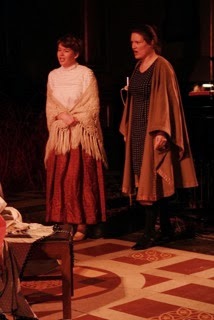Roger Thomas writes :
London is blessed with several small independent
opera companies that give an opportunity for
talented young singers to take on substantial leading roles rather than having their skills confined to the choruses of the big houses. This Opera Room Productions/Iris Theatre production at St Paul's Church, Covent Garden (the Actors' Church) was a good example of the genre.
opera companies that give an opportunity for
talented young singers to take on substantial leading roles rather than having their skills confined to the choruses of the big houses. This Opera Room Productions/Iris Theatre production at St Paul's Church, Covent Garden (the Actors' Church) was a good example of the genre.
The Invited (music by Richard Knight, libretto by Norman
Welch) is set in 1916 in an upper middle class household in rural Suffolk that
has been shrivelled by the vagaries of the First World War to the two daughters
of the house; their mother is away undergoing treatment for consumption, their
doctor father is serving on the Western Front and the servants have left.
The performance opened dramatically: with the sisters on
stage – early morning, with Violet (Sarah Minns) still in bed and Emily (Emma
Häll) at a table – the nine-piece orchestra, dressed in a fair approximation of
WW1 army uniforms, processed down the church aisle playing a martial theme. But
the coup de théâtre's effect was dissipated when they settled down and tuned
up. What a waste! Effectively the performance had to begin again.
At the opera's core is a dialogue between the two sisters
induced by the catastrophic losses of the war: “rational” Emily seeks comfort
from the natural world; Violet, increasingly deranged, seeks a solution in a
return of the ancient Greek gods, convinced that in a coming storm Zeus will
impregnate her with a new saviour who will cure the world of its ills. Emily
proves powerless to dissuade her sister. A third element driving the action is
a washerwoman from the village, Mrs Galloway (Miriam Sharrad), whose prying
curiosity fuelled by village rumours about the sisters' unorthodox behaviour
leads her to spy on their close physical intimacy. Eventually Mrs Galloway
reveals that her soldier son has been killed in action, and produces a letter
ostensibly indicating that one of the sisters – Violet, it turns out – is
pregnant by her son and had promised to marry him.
Violet strenuously denies all this, despite demands from her
sister and Mrs Galloway that she tell the truth. Having threatened Mrs Galloway
with a knife, she eventually stabs herself. As she dies, her sister,
grief-stricken, expels the washerwoman from the house, and moves off the stage
down the aisle, into the coming storm, singing that she will offer herself to
Zeus in her sister's place.
Minns gave a stunning performance as Violet, acting the
deranged and deluded young woman with scary conviction as she pointed
heavenwards and stared fixedly forward, at one point moving trance-like down
the aisle into the audience. Her singing was powerful and moving. All praise
here also to the director (Neil Smith) for tapping Minns's undoubted movement
skills (she has dance training as well as established singing credentials) and
talent for characterisation. Minns might not have the coloratura to cope with
the crazed Lucia di Lammermoor, but on this showing she could beat any singer
in acting that part. Häll sang strongly and convincingly as Violet's concerned
and loyally loving sister, although her diction was problematic from time to
time – a hindrance when so much
The string, wind, horn, percussion orchestra played
extremely well, actively and skilfully directed from the piano by Elspeth
Wilkes, so it seemed a pity that the music was so heavily scored – relentlessly
tutti and seemingly at times in competition with the singers rather than
supportive of them and the story line. With such skills available, it might
have been more appropriate to the action had there been more lyrical passages
using single instruments or groups of instruments.
Yuji Suzuki produced a simple but effective stage design – I particularly liked Violet's bier-like bed with blood-red cover – and Ciaran
Cunningham's lighting design and Ned Welch's sound got the approaching storm just right.


No comments:
Post a Comment